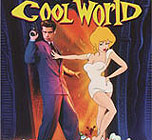|
|
|
|
Cool
World
|
 |
|
When Robert Zemeckis made Who Framed Roger Rabbit in 1988, the film was an enormous critical and commercial success because of its novelty and ingenuity. Notable for its impeccable mixture of live action and animation, its explosion of savvy pop culture jokes, its mixing of distinct genres and its wild storyline, it seemed like a true one-off event. Could there ever be a convincing sequel, copy or homage? Five years later, Cool World appears on video, skipping an Australian cinema release. It is clearly an attempt to recycle the Roger Rabbit formula, mixed with elements from the Batman movies, Beetlejuice (1988), and other extravagant special-effects fantasias of recent years. Kim Basinger, Gabriel Byrne and Brad Pitt tangle with an army of "doodles" in a fanciful "interworld matrix" where all normal space-time logic is suspended. Purely in terms of box office performance record, Cool World arrives on our shores as an ignoble failure. But, as directed by Ralph Bakshi (Fritz the Cat [1972], American Pop [1981]), it is a bizarre and fascinating experiment. Undoubtedly, it just wasn't enough like Roger Rabbit for widespread consumption. Bakshi goes straight for tasteless extravaganza, sensory overload and a hipper-than-thou indexing of the history of underground comics and cartoons. What plot the film possesses is single-mindedly riveted on transgressive sex – and the catastrophe that follows once a human and a doodle do it together. The characters are an unlovely lot: smarmy, sleazy and violent. As in a similarly weird post-Roger Rabbit effort, Maurizio Nichetti's Volere Volare (1991), what matters more than plot is the spectacular, ceaseless cascade of noises, caricatures, gags and outrageous apparitions. In his Movie and Video Guide, the redoubtable Leonard Maltin describes Cool World as "a Roger Corman version of Roger Rabbit". He means that as derision, but I offer it as recommendation. © Adrian Martin October 1993 |
![]()